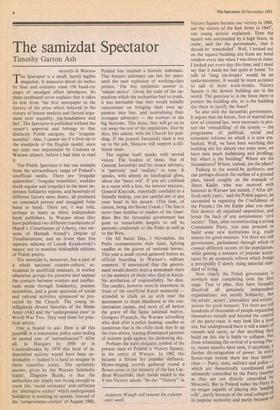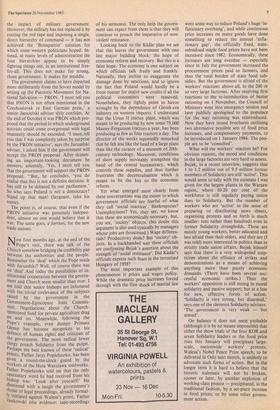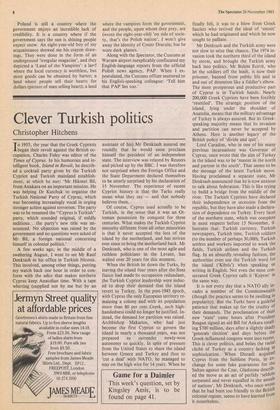The samizdat Spectator
Timothy Garton Ash
recently in Warsaw
The Spectator is a small, barely legible magazine. It measures about six inches by four and contains some 130 hand-cut pages of smudged offset letterpress. Its plain cardboard cover explains that it takes its title from 'the first newspaper in the history of the press which believed in the victory of honest analysis and factual argu- ment over stupidity, pig-headedness and lies'. The Spectator is published without the censor's approval and belongs to that distinctly Polish category, the 'irregular monthly'. Alas, I cannot say if it lives up to the standards of the English model, since my copy was impounded by Customs at Warsaw airport, before I had time to read it.
The Polish Spectator is but one example from the extraordinary range of Poland's unofficial media. There are 'irregular quarterlies', 'irregular monthlies', weeklies (both regular and irregular) in the most im- portant Solidarity regions, and hundreds of different factory news sheets, all produced on concealed presses and smuggled from hand to hand. There are, I was told, perhaps as many as thirty independent book publishers. In Warsaw alone they have published two different translations of Hayek's Constitution of Liberty, two ver- sions of Hannah Arendt's Origins of Totalitarianism, and no fewer than five separate editions of Leszek Kozakowski's essays; not to mention bibliophile editions of Polish poetry.
The samizdat is, moreover, but a part of a whole national counter-culture, ar- ticulated in unofficial seminars, in worker education groups (to preserve and expand the contacts between workers and intellec- tuals made through Solidarity), peasant assemblies, and a great spectrum of social and cultural activities sponsored or pro- tected by the Church. The young in- telligentsia devour histories of the Home Army (AK) and the 'underground state' in World War Two. They read them for prac- tical advice.
One is bound to ask: How is all this
possible in a communist police state ending its second year of 'normalisation'? After all, in Hungary by 1958 or in Czechoslovakia by 1970 this level of in- dependent activity would have been un- thinkable — indeed it is hard to imagine in those countries today. The optimistic answer, given by the Warsaw Solidarity leader, Zbigniew Bujak, is that the authorities are simply not strong enough to crush this 'social resistance' and suffocate the 'alternative society' which underground Solidarity is working to sustain. Instead of the `compromesso storico' of August 1980,
Poland has reached a historic stalemate. This historic stalemate can last for years: until the next explosion of working-class protest. The less optimistic answer is: 'salami tactics'. Given the scale of the op- position which the authorities had to crush, it was inevitable that they would initially concentrate on bringing their own ap- paratus into line, and neutralising their strongest adversary — the workers in the big factories. This done, they will go on to cut away the rest of the opposition, slice by slice, like salami, with the Church for pud- ding. If the present Jaruzelski team is not up to the job, Moscow will support a dif- ferent team.
The regime itself speaks with several voices. The loudest of these, that of General Jaruzelski and his closest advisers, is 'patriotic' and 'realistic' in tone. It speaks, with almost no ideological gloss, about the 'lesser evil'. If you are confined in a room with a lion, the interior minister, General Kiszczak, reportedly confided to a friendly bishop, you are careful not to put your head in his mouth. (The lion, of course, being the Soviet Union.) The line is more than familiar to readers of the Guar- dian. But the Jaruzelski government has gone to remarkable lengths to sell its patriotic credentials to the Poles as well as to the West.
On All Saints Day, 1 November, the Poles commemorate their dead, lighting candles at the graves of national heroes. This year a small crowd gathered before an official hoarding in Warsaw's military cemetery. It announced that the govern- ment would shortly erect a monument there to the memory of those who died in Katyn. No attribution of responsibility. No date. The candles, however were lit elsewhere: in front of the unofficial Katyn memorial scrawled in chalk on an arch near the monument to those murdered in the con- centration camps, and most of all before the grave of the latest national martyr, Grzegorz Przemyk, the Warsaw schoolboy who died after a police beating: candles so numerous that in the chilly dusk they lit up the trees above, tracing illuminated patterns of autumn gold against the darkening sky.
Perhaps the most eloquent symbol of the present state of Poland is Victory Square, in the centre of Warsaw. In 1982 this became a forum for popular defiance. Hymn-singing crowds gathered round a flower-cross to the memory of the late Car- dinal Wyszyitski, their hands raised in the V-for-Victory salute. `So the "Victory" in Victory Square became our victory in 1980, not the victory of the Red Army in 1945', one young activist explained. Then the square was surrounded by a high fence, in order, said the the government, that it should be 'remodelled'. Well, I looked out on the square/building site from my hotel window every day when I was there in June; I looked out every day this time; and I must say that it made me feel quite at home. To talk of 'long tea-breaks' would be an understatement. It would be more accurate to talk of short work-breaks. Victory Square is the slowest building site in the world. The question is: is the fence there to protect the building site, or is the building site there to justify the fence?
So also with the Jaruzelski government. It argues that the fences, first of martial and now of criminal law, were necessary to pro- tect the 'remodelling' of the system — the programme of political, social and economic reforms on which it is now em- barked. Well, we have been watching this building site for almost two years now; we have seen much bulldozing and levelling; but where is the building? Where are the foundations? Where, indeed, are the plans?
Talking to the would-be architects one can perhaps discern the outline of a ground plan, based roughly on the example of Jinos Kidar, who was received with honours in Warsaw last month. (`After dif- ficult early years,' said the Polish papers, he succeeded in regaining the Confidence of the People.) On the Kadar plan you must first destroy all organised opposition, and break the back of any autonomous 'civil society'. Then, after reconstructing a strong Communist Party, you may proceed to build some new institutions (e.g. trade unions for good measure. Yet there are still government, parliament) through which to consult different sectors of the population, while gaining a measure of popular accep- tance by an economic reform which brings a perceptibly if slowly rising material stan- dard of living. Now clearly the Polish government is nowhere near completing even the first stage. True to plan, they have formally dissolved all genuinely independent organisations: not merely Solidarity, but the artists', actors', journalists' and writers unions for good measure. Yet there are still hundreds of thousands of people organising themselves outside and beyond the control of the party-state. It may look like a level site, but underground there is still a maze of tunnels and caves, so that anything they build on this site is liable to collapse. Far from witnessing the revival of a strong Par- ty, recent months have seen, if anything, a further dis-integration of power. In every Soviet-type system there are four hierar- chies — Party, state, military and police — which are theoretically coordinated and ultimately controlled by the Party (insofar as they are not directly controlled by Moscow). But in Poland today the Party is no longer capable of .playing this 'leading role', partly because of the total collapse 0f„ its popular authority and partly because of
the impact of military government. However, the military has not replaced it by cutting the red tape and imposing a single, direct hierarchy of command — it has not achieved the 'Bonapartist' solution for which some western politicians hoped. In- stead, at many levels of administration the four hierarchies appear to be simply fighting things out, in an institutional free- for-all. This does not make for strong, clean government. It makes for muddle.
The government claims to have departed more deliberately from the Soviet model by setting up the Patriotic Movement for Na- tional Salvation — PRON. 'I must tell you that PRON is not often mentioned in the Czechoslovak or East German press,' a senior Jaruzelski adviser slyly confides. At the end of October it was PRON which pro- posed that the period in which underground activists could come overground with legal Immunity should be extended. 'I must.tell You that I was completely taken by surprise by the PRON initiative', says the Jaruzelski adviser. I asked him if the government will accept the PRON proposal. After skimm- ing an important-looking document he answers, solemnly, 'Yes, I must tell you that the government will support the PRON Proposal. "But, he concludes, 'you do realise that this is not a definite decision. It has still to be debated by our parliament.' So who says Poland is not a democracy? Stand up that man! (Sergeant, take his name).
The point is, of course, that even if the PRON initiative was genuinely indepen- dent, almost no one would believe that it was, The same goes, a fortiori, for the new trade unions.
Now four months ago, at the end of the Pope's visit, there was talk of the Church somehow bridging the credibility gap between the authorities and, the people. Remember the 'deal' which the Pope made with Jaruzelski? Well, of course there was no `deal'.And today the possibilities of in- stitutional cooperation between the govern- ment and Church seem smaller than ever. I am told that senior bishops are infuriated with the trivial irrelevance of the subjects raised by the government in the Government-Episcopate Joint Commis- sion. Negotiations about the Church- sponsored fund for private agriculture drag on and on. Meanwhile, following the Pope's example, even dumpy Primate Glemp has become outspoken in his defence of human rightss' and criticism of the government. The more radical lower Clergy preach Solidarity from the pulpit. Perhaps the best known of these 'radical' Priests, Father Jerzy Popieluszko, has been given a round-the-clock guard by the workers of the Huta Warszawa steelworks. Father Popieluszko told me that the only cautionary word he had received from his bishop was: 'Look after yourself!' He dismissed with a laugh the government's threat of legal proceedings, already formal- 1Y Initiated against Walesa's priest, Father Jankowski (the evidence: tape-recordings of his sermons). The only help the govern- ment can expect from them is that they will continue to preach the imperative of non- violent resistance.
Looking back to the Kadar plan we see that this leaves the government with one last major building block: the hope of economic reform and recovery. But this is a faint hope. The economy is one subject on which officials talk freely and frankly. Naturally, they incline to exaggerate the damage done by sanctions, and to ignore the fact that Poland would hardly be a front-runner for major new credits if all the political constraints were removed. Nonetheless, they rightly point to havoc wrought by the dependence of Gierek-era industry on western imports. I understand that the Ursus 11 tractor plant, which was meant to be producing by now some 75,000 Massey-Fergusson tractors a year, has been producing as few as four tractors a day. The director of the works reportedly remarked that he felt less like the head of a large plant than like the curator of a museum of 20th- century technology. Moreover, conditions of short supply inevitably strengthen the hand of the central bureaucracy, which controls these supplies, and thus further frustrates the decentralisation which is meant to be the key to the economic reform.
Yet what emerged most clearly from these conversations was the extent to which government officials are fearful of what they call 'social reaction'. Bankruptcies? Unemployment? Yes, they say, we know that these are economically necessary, but, you see, 'society' objects. (No doubt this argument is also used cynically by managers whose jobs are threatened.) Wage differen- tials? Productivity deals? But 'society' ob- jects. In a backhanded way these officials are confirming Bujak's assertion about the strength of 'social resistance'. Did Kadar's officials express such fears in the terrorised Hungary of 1958? The most important example of this phenomenon is prices and wages policy. While the dramatic price increases forced through with the first shock of martial law
went some way to reduce Poland's huge 'in- flationary overhang', and while continuous price increases on many goods have done something to reduce the annual 'infla- tionary gap', the officially fixed, state- subsidised staple food prices have not been increased since 1982. Economically, these increases are long overdue — especially since in July the government increased the procurement prices paid to farmers, and thus the total burden of state food sub- sidies. But the government is afraid of the Workers' reaction: above all, in the 200 or so very large factories. After receiving first reactions to the re-introduction of butter rationing on 1 November, the Council of Ministers went into emergency session and later publicly apologised to the populace for the way rationing was reintroduced. Now they have issued brochures outlining two alternative possible sets of food price increases, and compensatory payments, to be introduced on 1 January 1984. The peo- ple are to be 'consulted'.
What will the workers' reaction be? For obvious reasons, the mood and conditions in the large factories are very hard to assess. Bujak, in a recent interview, suggests that I to L2 million out of 9.5 million former members of Solidarity are still 'active'. This would seem to tally with the estimate I was given for the largest plants in the Warsaw region, where 10-20 per cent of the workforce is still regularly paying union dues to Solidarity. But the number of workers who are 'active' in the sense of preparing or distributing news sheets, organising protests and so forth is much smaller: tens rather than hundreds even in former Solidarity strongholds. These are mostly young workers, better educated and less afraid than their elders, and they are (I was told) more interested in politics than in strictly trade union affairs. Bujak himself says that there is a very widespread scep- ticism about the efficacy of strikes and demonstrations as a means of achieving anything more than purely economic demands. (There have been several suc- cessful economic strikes.) Thus the workers' opposition is still strong in moral solidarity and passive support; but at a loss for new, effective forms of action.
'Solidarity is very strong, but disarthed,' says one of the cleverest Solidarity advisers. `The government is very weak — but armed'.
On balance it does not seem probable (although it is by no means impossible) that either the show trials of the four KOR and seven Solidarity leaders or the food price rises this January will precipitate large- scale, nationwide workers' protests.
Walesa's Nobel Peace Prize speech, to be delivered in Oslo next month, is unlikely to advocate such forms of action. But in the longer term it is hard to believe that the historic stalemate will not be broken,
sooner or later, by another explosion of working-class protest — precipitated, in the traditional fashion, by a set-piece increase in food prices, or by some other govern- ment action.
Poland is still a country where the government enjoys an incredible lack of credibility. It is a country where if the government says the sun is shining people expect snow. An eight-year-old boy of my acquaintance showed me his crayon draw- ings. They were done in the form of an underground 'irregular magazine', and they depicted a 'Land of the Vampires': a land where the local currency is worthless, but most goods can be obtained by barter; a land where people sell their hearts for dollars (picture of man selling heart); a land where the vampires form the government, and the people, upon whom they prey, are (wrote the eight-year-old) 'on side of socie- ty, that's the Polish nation'. I won't give away the identity of Count Dracula; but he wore dark glasses.
Along with the Spectator, the Customs at Warsaw airport inexplicably confiscated my English-language reports from the official Polish news agency, PAP. When I ex- postulated, the Customs officer muttered to his English-speaking colleague: 'Tell him that PAP lies too.'
















































 Previous page
Previous page